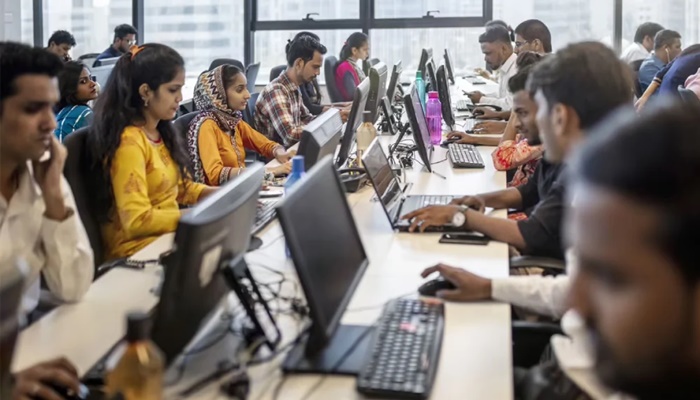A Reddit user has sparked debate over the composition of Singapore’s tech workforce, questioning the high number of foreigners in the industry.
The discussion began after the user reposted a message originally shared on the Tea Talk app, raising concerns about the lack of local representation in tech teams.
The original post, titled “Not trying to be xenophobic, but can someone explain?”, claimed that despite a perceived shortage of tech jobs, many Singaporeans with strong résumés are struggling to secure full-time roles.
Even those who do find work are often offered only short-term contracts lasting six to twelve months.
“But every single company I’ve seen, especially during internship, the whole team is mostly foreigners,” the user wrote.
“Sometimes I’m literally the only Singaporean on the whole floor.”
While the poster said it was understandable for companies like TikTok to hire Chinese nationals due to their origin, they expressed surprise at the staffing patterns in local banks.
“Literally all the local banks’ tech offices are 90% Indian nationals. Even 90% might be an understatement,” the user claimed, adding that on their entire office floor, there was only one Malaysian, two Vietnamese, and the rest were Indian.
The post also questioned the quality of code produced by some foreign colleagues.
“It’s not like they’re some god-tier coding pros. The code quality I’ve seen them write is some of the worst I’ve seen.”
Reflecting on their earlier views, the user wrote: “I used to laugh at all those xenophobic uncles on HardwareZone, thinking ‘lol, it’s because they never upskill’ or ‘skill issue.’
But now that I’m being affected by CECA, I get it. Anyone else can relate? I feel like I’m the crazy one here.”
The Comprehensive Economic Cooperation Agreement (CECA) is a free trade agreement signed between Singapore and India on 29 June 2005.
It is intended to strengthen bilateral trade and economic collaboration.
The Reddit user concluded by asking the community.
“Is it true the local tech scene is like that? Or is it just exaggerated or the OP being xenophobic?”
Reddit Users Weigh In
The post prompted a range of responses. Several Reddit users agreed that the scenario described is not uncommon and has been occurring in Singapore’s tech sector for some time.
One commenter, who claimed to have conducted team-building sessions for multiple companies, shared that locals were often either in the minority or entirely absent from tech teams.
One user commented that it was not an exaggeration, noting that in their first job at a large MNC, the team comprised 26 people — only four were Singaporeans, and the rest were Chinese.
“In my current role, I think it’s safe to say that 70–80% of my department are CECAs,” the user added.
The user also suggested that foreign employees may be preferred due to their perceived job stability.
“I spoke to one of them, and it seems like it’s extremely difficult for them to job hop. Maybe that’s why employers prefer them?” they wrote.
Others echoed the sentiment, pointing out that employers may see hiring locals as riskier, particularly in tech roles where long-term commitment is important.
In contrast, foreign workers—who face more restrictions when switching jobs—might be viewed as more likely to stay.
However, not all agreed that nationality was the core issue. One user argued that the underlying driver is economic.
“People with ‘decked out’ résumés do not want to work for less money and more hours,” they said.
“It’s all capitalism — nothing to do with Indians. Whoever is ready to do this, banks will hire them.”
One user, who claimed to work in a tech SME, commented that because SMEs typically offer below-market rates, only foreigners tend to apply for those jobs.
They added that tech roles are generally not very attractive to locals — unless it’s in cybertech.
Ministry of Manpower (MOM) revealed the proportion of Employment Pass (EP) holders from India had doubled — from 14 per cent in 2005 to 25 per cent in 2020.
According to then Manpower Minister Dr Tan See Leng, this increase was driven by the rapid expansion of Singapore’s digital economy, rather than by preferential treatment under CECA.
“As every sector seeks to be digitally enabled, their need for tech talent has grown significantly,” Tan told Parliament on 6 July 2021.
He emphasised that Singapore did not have enough local workers to meet the growing demand. In the infocomm sector alone, around 6,000 jobs remained unfilled at the time.
He also pointed out that while China is another major source of tech talent, many Chinese professionals were choosing to remain in their home country to meet strong domestic demand—especially as China continued to produce unicorns, or start-ups valued at over US$1 billion.
Tan noted that the proportion of EP holders from China had remained relatively stable between 2005 and 2020.
The top nationalities comprising around two-thirds of Singapore’s EP holders since 2005 were consistently from China, India, Japan, Malaysia, the Philippines, and Britain.
Labour Market in 2024
According to MOM’s latest labour market report, Singapore’s employment landscape continued to evolve in 2024.
The labour market expanded by 44,500 jobs, driven by strong economic performance and positive business sentiment.
Non-residents accounted for the bulk of this growth, with 35,700 new jobs, while resident employment increased by 8,800—reversing the decline of 4,600 in 2023.
Resident job gains were largely concentrated in higher-skilled sectors, including Financial and Insurance Services, Health and Social Work, Professional Services, and Information and Communications.
Non-resident employment growth slowed from 83,500 in 2023 to 35,700 in 2024, with most of the increase coming from Work Permit holders who filled 39,400 roles—primarily in blue-collar jobs less favoured by residents.
Employment levels among EP and S Pass holders remained stable following prior growth in 2022 and 2023.
MOM attributed this stabilisation to companies adjusting to revised salary thresholds and the implementation of the COMPASS framework for assessing EP applications.
Despite the overall moderation in job growth, non-residents continued to take up a significant share of new employment.
From January 2022 to December 2024, 91.4 per cent of total employment growth—320,800 out of 351,100 jobs—was attributed to non-residents.
Even with the modest rebound in resident employment in 2024, the broader trend over the past three years shows that non-residents have accounted for the vast majority of new jobs created in Singapore.




















